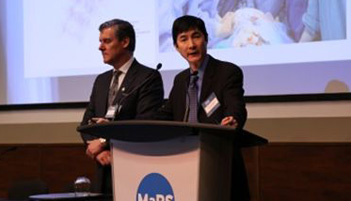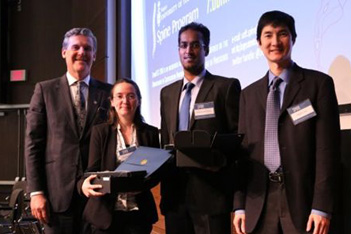SpineFEST™
SHAPING THE LANDSCAPE OF SPINE RESEARCH AND EDUCATION

Michael Fehlings and Albert Yee
On June12, 2016 the University of Toronto (U of T)
Department of Surgery Spine Program celebrated its
8th annual SpineFEST™ meeting at MaRS building.
SpineFEST™ is the key annual academic meeting for
the U of T Spine Program. Bringing together clinicians
and scientists around the city’s university affiliated hospitals,
this event aims to foster collaboration within the
spine community locally and also serves as a venue to
disseminate our activities to invited professors nationally
and internationally.
Co-led by Dr. Michael Fehlings (University Health
Network-Toronto Western Hospital/ UHN-TWH) and
Dr. Albert Yee (Sunnybrook Health Sciences Centre/
SBHC), we held thematic sessions on cervical myelopathy
and cervical deformity, also on controversies and complexities
in cervical spine diagnosis including related management.
We enjoyed research presentations by many of
our city-wide spine trainees. Moderated by Dr. Fehlings,
our keynote Tator-Hall Visiting Professorship Lecture
was presented by Professor Daniel Riew, Professor
of Orthopaedic Surgery, Co-Chief of Spine Division,
and Director of Cervical Spine Surgery at Columbia
Medical Center. Dr. Riew provided a dynamic talk titled
“The Post-operative Patient with Persistent or Recurrent
Symptoms”. He outlined some of the most common
etiologies for failure of surgery including pseudarthrosis,
inadequate decompression, poorly placed instrumentation,
wrong-level surgery and non-cervical etiology. Dr.
Riew reviewed accurate methods to avoid failure and outlined
approaches to revision surgery. Our keynote speaker
also led important discussions on how to communicate
poor outcomes to patients after surgery.
Moderated by Dr. Eric Massicotte (UHN-TWH),
the morning session on cervical myelopathy and cervical
deformity presented the latest updates on the topic. Dr.
Fehlings engaged us in an important dialogue about
“what’s new & hot” in optimizing surgical outcomes for
degenerative cervical myelopathy. Dr. Stephen Lewis
(UHN-TWH & Hospital for Sick Children/HSC) provided
an overview on the evaluation and management of
cervical deformity, followed by a review of novel assessment
techniques defining degenerative cervical myelopathy
by Dr Sukhvinder Kalsi-Ryan’s (UHN-TWH).
The day continued with excellent presentations and
discussions moderated by Dr. Howard Ginsberg (St.
Michael’s Hospital/SMH) on controversies and complexities
in cervical spine diagnosis and management.
Dr. Henry Ahn (SMH) led off the session focusing on
the role and timing of surgery for traumatic central cord
syndrome. Dr Yee (SHSC) provided an evidence-based
update on spine clearance in the trauma patient as well
as process improvement initiatives from a Level I trauma
centre perspective. Dr. Michael Angel shared his experience
as a neurologist as he spoke about pearls and pitfalls
of cervical myelopathy diagnosis. Lindsay Tetreault
(PhD, Postdoc, UHN-Krembil Research Institute/KRI)
concluded the session with an interesting talk reviewing
the current state of the literature and outlining important
knowledge gaps in degenerative cervical myelopathy.
In the academic session, our spine scientist surgeon
trainees updated us on their work. Christopher Witiw
(MD, PGY5 Neurosurgery) presented the rationale for
surgical intervention and reviewed a health economic
and patient-centered analysis on the value of surgery
for degenerative cervical myelopathy. Robert Ravinsky
(MD, PGY5 Orthopaedic Surgery) discussed spine
surgery fellowship education and the competence-based
training education syllabus in Canada and beyond.
|
This year, we received around 40 abstract submissions
spanning clinical and pre-clinical spine research. Winners of 1st place abstract, 2nd place abstract, and
3rd place abstract provided oral presentations on their
research findings. In first place clinical research abstract
Alex Laliberte (PhD candidate -Institute of Medical
Sciences/IMS) presented his work titled Hypoxia-Related
MicroRNAs are Biomarkers of Degenerative Cervical
Myelopathy Severity. In first place basic science research
abstract Spyridon Karadimas (MD, PhD candidate,
UHN-KRI) talked about the Riluzole blocks perioperative
ischemia-reperfusion injury and enhances postdecompression
outcomes in cervical spondylotic myelopathy.

Michael Fehlings, Pía Vidal, Daipayan Guha, and Albert Yee
In 2nd place clinical research abstract Daipayan Guha
(MD, PGY4 Neurosurgery) presented his work titled
Accuracy Validation in the Cervical Spine of a Novel,
Rapid, Optical Intraoperative Spinal Navigation System:
Initial Clinical Feasibility. In 2nd place basic science
research abstract Pía Vidal (PhD, Postdoc, UHN-KRI)
updated us about her work on early decompression attenuation
of Ischemia-Reperfusion-Injury mediated inflammation
for Cervical Degenerative Myelopathy (DCM).
In 3rd place clinical research abstract Allan Martin
(MD, BASc (EngSci), PGY4 Neurosurgery) presented
his research titled Next-Generation MRI Identifies Tract-
Specific Injury and Predicts Focal Neurological Deficits in
Degenerative Cervical Myelopathy. Finally, in 3rd place
basic science research abstract Stewart McLachlin (PhD,
Postdoc, Sunnybrook Research Institute/ SRI) presented
his work titled Virtual framework to evaluate osseous fixation
pathways in the spine.
SpineFEST™ continued our green and ecofriendly
session with 24 e-poster presentations. First Prize e-Poster
Presentation was awarded to Laureen Hachem (MD
Candidate, UHN-KRI) for her presentation entitled
Glutamate increases in vitro survival and proliferation
and attenuates oxidative stress-induced cell death in
adult spinal cord-derived neural stem/progenitor cells
via non-NMDA ionotropic glutamate receptors. The
Second Prize went to Ayelet Atkins (Postdoc, SRI) and
Mikhail Burke (PhD candidate SRI) for their work
titled Characterization of microdamage accumulation in
metastatically- involved vertebrae.
SpineFEST™ ended with an enjoyable evening with
the U of T-GTA Spine Rounds chaired by Dr. Joel
Finkelstein (SHSC) at the Park Hyatt Roof Salon. Dr.
Daniel Riew provided a talk arguing whether we are
overspecialized in spine care. The evening continued
with celebration of our city-wide spine fellows graduation.
Our Program Co-Directors Drs Fehlings and Yee
congratulated our fellows on the completion of their
2015/16 fellowship year and presented their U of T
Spine Program fellowship certificates and plaques.
The U of T Spine Program congratulated our citywide
spine fellows (Drs Mohammad Zarrabian, So Kato,
Safraz Mohammed, Markian Pahuta, Mark Kotter,
Kevin Koo, Amit Keren, Kachinga Sichizya, Michael
Dodds, and David Bellut) on a successful completion
of their fellowship. On behalf of our citywide spine
surgeons (Drs Michael Fehlings, Eric Massicotte, Raj
Rampersaud, Stephen Lewis, Reinhard Zeller, Albert
Yee, Joel Finkelstien, Michael Ford, Howard Ginsberg,
and Henry Ahn) we extend best wishes to all fellows in
their career and future endeavors.
The U of T Spine Program would like to thank
our participants for contributing towards the ongoing
success of SpineFEST. We extend our appreciation to
Professor Charles Tator, Professor Hamilton Hall,
Professor Andres Lozano, Professor Peter Ferguson,
and Professor James Rutka for their strong support of
SpineFEST™ and the U of T Department of Surgery
Spine Program over many years. The Program also
extends gratitude to our educational event sponsors
Medtronic, DePuy Synthes & Ethicon, Zimmer
Biomet, and Stryker.
Nadia Jaber with input from
Michael Fehlings and Albert Yee
|